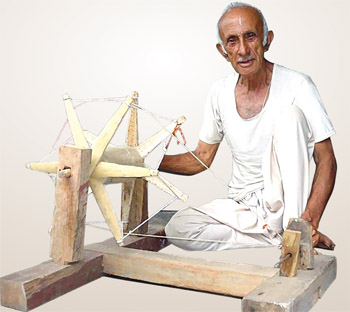
Many heroes of our Independence movement have been relegated to the past. Despite their vital role in our campaign for emancipation from foreign dominance, they have mostly gone unnoticed. Like countless other social reformers and their principles, they have faded into obscurity. One of these unsung pioneers was the late Trilochan Pokhrel, often known as Gandhi Pokhrel, a Sikkimese native.
India won Independence from the British Empire in 1947, but in doing so, many countrymen sacrificed their lives fighting for freedom from the tyrannical rule of the imperialist with a spirited patriotism and undaunted courage. Trilochan Pokhrel was one of them.
Early Lessons at Sabarmati Ashram
Pokhrel was born to Bhadralal and Januka Pokhrel and brought up at Tareythang Busty in Pakyong subdivision of East Sikkim in the last decade of the 19th Century. During his youth, he was greatly influenced by the people’s movement started by Mahatma Gandhi, which was based on satya and ahimsa’s fundamental principles. He stayed with Gandhiji at the Sabarmati Ashram in Gujarat and the Sarvodaya Ashram in Bihar. During his stay there, Pokhrel is known to have spent his time spinning the charkha rendering his services for the ashrams and assisting Gandhi in his daily affairs.
Popularising Swadeshi Among Sikkimese Peasantry
Pokhrel never used to stay at home for a long time. He was actively involved in propagating the concept of Swadeshi of Mahatma Gandhi among the Sikkimese peasantry. In his leisure time, he visited the local haat-bazar and sat there aside with his charkha to make cotton threads.
Gandhi Get Up
Akin to Gandhiji, he too wore a piece of cotton dhoti and a pair of khadau or wooden slippers. That was how he earned the nickname ‘Gandhi Pokhrel’. It is said that he used to greet elders in the village with Bande Mataram. This prompted some people in his village to refer to him as Bande Pokhrel. He used to convey the message of Vande Mataram and inculcate the spirit of the Swadeshi Movement, i.e. to spin and wear swadeshi cloths, to establish Khadi and village industries etc., so that the villages could be developed and income generation for the poor. He was one of the great advocates for swadeshi goods because he believed that this is the only way the economy could be revived.
Catalyst for joining the Indian Freedom Movement
Pokhrel was the first Sikkimese freedom fighter who fought against the British hegemony. Sikkim was then a protectorate State of the British. In the year 1861, the signature of the Treaty of Tumlong effectively made Sikkim a de-facto protectorate of British India. This had a huge impact on Sikkim’s sovereignty. However, nearly three decades later, the British established a formal protectorate over Sikkim, which the Chinese recognised in the Anglo-Chinese Treaty of 1890. British India assumed responsibility for the defence and territorial integrity of Sikkim and was granted the right to take such measures as it considered necessary to achieve this end of the security of India, including the stationing of British Indian armed forces anywhere within Sikkim. Another provision stipulated that the external affairs of Sikkim shall be conducted and regulated solely by the Government of British India and that Sikkim shall have no dealings with any foreign power. Sikkimese subjects travelling abroad would have the status of Indian protected persons and be entitled to the same protection and facilities and subject to the same rigorous foreign exchange restrictions as Indian nationals. With the subsequent appointment of Political Officers in Sikkim from JC White in 1888 onwards, Britishers directly or indirectly influenced Sikkim, which made Trilochan Pokhrel join the Indian Freedom Movement.
Trilochan Pokhrel participated with great fervour in the famous Bharat Chhodo Andolan of 1942. The contemporary sources mention his stay with Gandhiji at Sabarmati Ashram in Gujarat and Sarvodaya Ashram in Bihar. During his stay with Gandhiji, he spun the charkha, rendered his service for the Ashrams, and assisted the Mahatma in his daily affairs
There is hardly any information about Pokhrel’s early days in the freedom struggle. But he was seriously involved in the famousBharat Chhodo Andolan(Quit India Movement) of 1942. The contemporary sources mention his stay with Gandhiji at Sabarmati Ashram in Gujarat and Sarvodaya Ashram in Bihar. During his stay with Gandhiji, he spun the Charkha, rendered his service for the Ashrams, and assisted the Mahatma in his daily affairs.
Following Independence on August 15, 1947, Sikkim retained some semblance of its Independence as India’s first Prime Minister, Jawaharlal Nehru, agreed to maintain the erstwhile kingdom’s special protectorate status. While the Sikkimese kingdom maintained internal autonomy, it let the Indian Union handle external affairs. However, things came to a head with the Chinese crackdown in the late 1950s and heavy immigration from Nepal.
Meanwhile, Pokhrel continued travelling across India, with his last visit home happening in 1957 when Nehru visited the erstwhile kingdom. During Nehru’s visit, Pokhrel spoke in a voluminous manner. As per official records, he passed away on January 27, 1969, in Purnia district, Bihar, while his descendants migrated to Assam. Only six years after his demise, Sikkim became an official State of the Indian Union.
During the 43rd State Celebration in May 2018, the Sikkimese Government recognised his achievements in the Indian freedom fight by awarding him the LD Kazi Award for Democratic Movement. Obviously, Indian textbooks don’t have much about his life, but recognitions like this give us hope that more Indians will learn about this overlooked role in the liberation movement one day.
courtesy : ORGANISER














